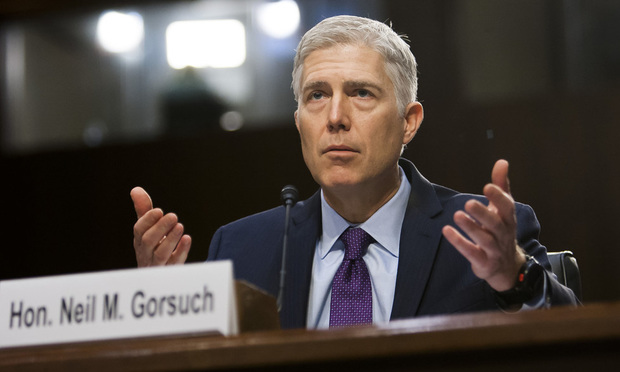The Supreme Court Is Center Stage in Lawyer-Playwright's Tribal-Rights Drama
"We have to educate Americans about who we are. Let's face it, no one else is. Theater is a very powerful way to do that," says Mary Kathryn Nagle, the lawyer and playwright whose play "Sovereignty" explores Native American rights through the U.S. Supreme Court past and present.
February 12, 2018 at 02:35 PM
8 minute read
 Jake Waid and Kyla García in the play Mary Kathryn Nagle's play Sovereignty at Arena Stage in Washington. Photo by C. Stanley Photography
Jake Waid and Kyla García in the play Mary Kathryn Nagle's play Sovereignty at Arena Stage in Washington. Photo by C. Stanley Photography Lawyers leave Big Law for various reasons. Cherokee lawyer and playwright Mary Kathryn Nagle said her desire to continue her grandfather's struggle for Native American sovereignty told her it was time to go.
Nagle, who practiced commercial litigation at Quinn Emanuel Urquhart & Sullivan, left the firm in 2015 to write “Sovereignty,” the first Native American play produced at Washington's Arena Stage and Nagle's entry into the mainstream of American playwrights.
“My experience at Quinn Emanuel was phenomenal and really impactful,” Nagle told The National Law Journal. “I've always wanted to fight to restore the sovereignty my grandfather fought for. I will always use the tool kit the firm gave me.”
 Mary Kathryn Nagle
Mary Kathryn NagleAfter Nagle left Quinn Emanuel, she joined Washington's Pipestem Law at the urging of name partner William Pipestem. The firm litigates on behalf of the rights of American Indians and tribal governments. “This was my dream job I was preparing my whole life to do,” Nagle said. “Now I'm doing the work I feel I'm destined to do, and that's really satisfying.”
In her play, the Cherokee struggle for recognition of its inherent sovereignty unfolds in the interplay of two time periods: from the 1800s treachery of President Andrew Jackson to recent, hostile U.S. Supreme Court decisions. Indeed, the Supreme Court looms large in her story—Justice Neil Gorsuch is mentioned—and three of its decisions as well as the federal Violence Against Women Act are central to the narrative.
Tribal sovereignty underlies many of the Indian law cases that come before the Supreme Court, and it is at the center of Nagle's passionate new play. Nagle has written nine other plays, almost all of which have Native American and legal themes. Her play “Sovereignty” is not only the story of the Cherokee fight for recognition of its sovereignty but also a love story and “a story about the Supreme Court.”
Nagle is a direct descendant of Cherokee National Council member John Ridge, a central character in the play. Ridge was a signer of the Treaty of Echota, which led to the removal of the Cherokee Nation from their ancestral homes in Georgia in 1835. ”In our Cherokee understanding, he is my grandfather,” she said. “We see no need to denote 'greats' as the number of generations back is without significance. The significance is that he is my grandfather and I carry on his legacy.”
Nagle's play shows the tension within the Cherokee leadership over whether to stay and fight—and likely be killed—or to leave and save the tribe. After the removal, Ridge was assassinated by treaty dissidents.
The story moves back and forth from the 1800s when the Cherokee Nation desperately fought as a sovereign nation to preserve its territory and its people from lawless and brutal attacks by the state of Georgia and the duplicity of President Andrew Jackson—which culminated in the devastating Trail of Tears—to the tribe's present-day struggle to assert its civil and criminal jurisdiction over non-Indians who commit crimes and torts on their lands.
At a midweek matinee, high school students filled the balcony seats and reacted loudly and emotionally to the racist insults casually lobbed at Cherokee chiefs and officers by Jackson's character and gasped at present-day violence against Cherokees by non-Indian characters who, because of a Supreme Court decision, could not be prosecuted in their own judicial system.
“It's always amazing to me the resonance this has with the audience right now,” Nagle said. “When I started writing the play in 2015, no one even thought of Trump in the White House. Who could have predicted he would put a portrait of Andrew Jackson in the Oval Office?”
In 1832, Chief Justice John Marshall wrote in Worcester v. Georgia that the Cherokee Nation was a separate sovereign nation with legitimate title to its ancestral homeland. He rebuked Georgia for its seizure of Cherokee homes and land. Jackson is commonly quoted as having said in response: “John Marshall has made his decision; now let him enforce it.”
While the Worcester decision is critical to Nagle's story of the Cherokees in the 1800s, two other high court rulings and the Violence Against Women Act are central to the present-day part of the play.
In 1978, then Justice William Rehnquist, writing for a 6-2 majority in Oliphant v. Suquamish Indian Tribe, said tribal governments do not have criminal jurisdiction over non-Indians who commit crimes on Indian land. Justice Thurgood Marshall, joined by Chief Justice Warren Burger, dissented, saying; “In the absence of affirmative withdrawal by treaty or statute, I am of the view that Indian tribes enjoy, as a necessary aspect of their retained sovereignty, the right to try and punish all persons who commit offenses against tribal law within the reservation.”
And in 2016, a deadlocked high court in Dollar General v. Mississippi Band of Choctaw Indians affirmed a lower court decision holding that tribal courts have jurisdiction over civil tort claims against nonmembers—here a claim for damages against Dollar General whose store manager allegedly sexually molested a Choctaw youth on Choctaw land. Hogan Lovells partner Neal Katyal argued for the Choctaw; Goldstein & Russell's Thomas Goldstein represented Dollar General.
Nagle has filed a number of high court amicus briefs, including one supporting the Choctaw in Dollar General.
Native Americans have lost more than 70 percent of their cases in the last three decades. Their lack of success is the result of the justices' “lack of legitimate jurisprudence,” Nagle said. “Look at Oliphant. What are the constitutional underpinnings of that, of declaring a treaty has no legal significance? I think if the court understood its own Constitution, it would be better equipped to understand these cases. The Constitution says treaties are the law of the land. That's been overlooked.”
Nagle said she is hopeful Gorsuch could help to change Native Americans' track record in the high court. Gorsuch had considerable experience with Indian law cases when he was on the U.S. Court of Appeals for the Tenth Circuit, she said. He has an “understanding and appreciation of tribal sovereignty and its relationship with the United States.”
 Neil Gorsuch testifies at his confirmation hearing in March. Photo: Diego M. Radzinschi/ NLJ
Neil Gorsuch testifies at his confirmation hearing in March. Photo: Diego M. Radzinschi/ NLJ Nagle said she hopes the justices would see her play, and she invited the Dollar General lawyers—Goldstein and Katyal—to come as well, as her guests.
The Dollar General arguments, she said, were “incredibly disappointing.” The discussion and questions focused on Dollar General's right as an American citizen to due process, she said, and inherent in that was the assumption that tribal courts are unfair, “which is not based in fact but in prejudice.” Katyal and Goldstein told The National Law Journal they would try to attend.
These days, Nagle admits to being tugged “very hard” between practicing law and playwriting.
“I'm blessed with a talented legal team and my law partner is incredible,” she said. “He sees the connection between my work in the theater and what we do in the courts. We understand there are a lot of harmful narratives out there, like the Dollar General case.”
During after-play discussions with the audience, Arena Stage has brought in speakers, including tribal judges. “They went to top law schools and clerkships,” Nagle said. “It's really helping to dispel some of the myths about tribal courts and government. That's something you can't do in a legal brief.”
When Americans go to a play about Alexander Hamilton, they start with some knowledge of who he was, she added. “We have to educate Americans about who we are. Let's face it, no one else is. Theater is a very powerful way to do that.”
This content has been archived. It is available through our partners, LexisNexis® and Bloomberg Law.
To view this content, please continue to their sites.
Not a Lexis Subscriber?
Subscribe Now
Not a Bloomberg Law Subscriber?
Subscribe Now
NOT FOR REPRINT
© 2025 ALM Global, LLC, All Rights Reserved. Request academic re-use from www.copyright.com. All other uses, submit a request to [email protected]. For more information visit Asset & Logo Licensing.
You Might Like
View All
'The Tobacco Industry of This Decade': Slew of Class Actions Accuse DraftKings of Creating Addicts
5 minute read
4th Circuit Revives Racial Harassment Lawsuit Against North Carolina School District
3 minute read
Khan Defends FTC Tenure, Does Not Address Post-Inauguration Plans

‘Old Home Week’: Justice Breyer Hears Challenge to Cruise Ship Ordinance in 1st Circuit
Trending Stories
Who Got The Work
Michael G. Bongiorno, Andrew Scott Dulberg and Elizabeth E. Driscoll from Wilmer Cutler Pickering Hale and Dorr have stepped in to represent Symbotic Inc., an A.I.-enabled technology platform that focuses on increasing supply chain efficiency, and other defendants in a pending shareholder derivative lawsuit. The case, filed Oct. 2 in Massachusetts District Court by the Brown Law Firm on behalf of Stephen Austen, accuses certain officers and directors of misleading investors in regard to Symbotic's potential for margin growth by failing to disclose that the company was not equipped to timely deploy its systems or manage expenses through project delays. The case, assigned to U.S. District Judge Nathaniel M. Gorton, is 1:24-cv-12522, Austen v. Cohen et al.
Who Got The Work
Edmund Polubinski and Marie Killmond of Davis Polk & Wardwell have entered appearances for data platform software development company MongoDB and other defendants in a pending shareholder derivative lawsuit. The action, filed Oct. 7 in New York Southern District Court by the Brown Law Firm, accuses the company's directors and/or officers of falsely expressing confidence in the company’s restructuring of its sales incentive plan and downplaying the severity of decreases in its upfront commitments. The case is 1:24-cv-07594, Roy v. Ittycheria et al.
Who Got The Work
Amy O. Bruchs and Kurt F. Ellison of Michael Best & Friedrich have entered appearances for Epic Systems Corp. in a pending employment discrimination lawsuit. The suit was filed Sept. 7 in Wisconsin Western District Court by Levine Eisberner LLC and Siri & Glimstad on behalf of a project manager who claims that he was wrongfully terminated after applying for a religious exemption to the defendant's COVID-19 vaccine mandate. The case, assigned to U.S. Magistrate Judge Anita Marie Boor, is 3:24-cv-00630, Secker, Nathan v. Epic Systems Corporation.
Who Got The Work
David X. Sullivan, Thomas J. Finn and Gregory A. Hall from McCarter & English have entered appearances for Sunrun Installation Services in a pending civil rights lawsuit. The complaint was filed Sept. 4 in Connecticut District Court by attorney Robert M. Berke on behalf of former employee George Edward Steins, who was arrested and charged with employing an unregistered home improvement salesperson. The complaint alleges that had Sunrun informed the Connecticut Department of Consumer Protection that the plaintiff's employment had ended in 2017 and that he no longer held Sunrun's home improvement contractor license, he would not have been hit with charges, which were dismissed in May 2024. The case, assigned to U.S. District Judge Jeffrey A. Meyer, is 3:24-cv-01423, Steins v. Sunrun, Inc. et al.
Who Got The Work
Greenberg Traurig shareholder Joshua L. Raskin has entered an appearance for boohoo.com UK Ltd. in a pending patent infringement lawsuit. The suit, filed Sept. 3 in Texas Eastern District Court by Rozier Hardt McDonough on behalf of Alto Dynamics, asserts five patents related to an online shopping platform. The case, assigned to U.S. District Judge Rodney Gilstrap, is 2:24-cv-00719, Alto Dynamics, LLC v. boohoo.com UK Limited.
Featured Firms
Law Offices of Gary Martin Hays & Associates, P.C.
(470) 294-1674
Law Offices of Mark E. Salomone
(857) 444-6468
Smith & Hassler
(713) 739-1250










